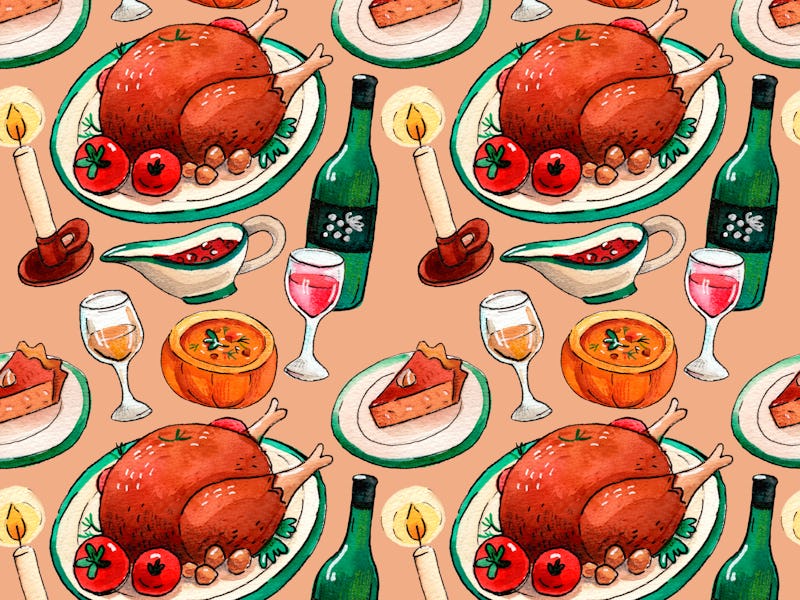How to master intuitive eating during the toughest time of the year
Here's your guide to avoiding holiday shame cycles.

Staying sane and healthy through the marathon of holiday meals can be maddening. However, one “anti-diet” could be the key to eating mindfully, even when you’re surrounded by sugar cookies and judgmental relatives.
It’s called intuitive eating. Created as a response to dieting culture, intuitive eating is defined by a simple philosophy: Listen to your body and do what makes you feel good.
“Remember, nobody can possibly know what your body feels like. Nobody knows what hunger feels like to you, what satisfaction feels like,” dietician Evelyn Tribole, one of the original champions of intuitive eating, tells Inverse.
Inverse rounded up the best tips for avoiding holiday shame cycles and keeping up intuitive eating into the new year. Underling all of the advice is a mantra shared by Tribole: It’s important to enjoy and connect with food.
How to eat intuitively
Intuitive eating emerged in the 1990s, popularized by Tribole and co-author Elyse Resch in their book, Intuitive Eating: A Revolutionary Program That Works. The book outlines ten core principles of intuitive eating:
- Reject the diet mentality
- Honor your hunger
- Make peace with food
- Challenge the food police
- Respect your fullness
- Discover the satisfaction factor
- Honor your feelings without using food
- Respect your body
- Exercise — feel the difference
- Honor your health
These principles boil down to trusting yourself. Intuitive eating doesn’t stress “good” or “bad” foods, exercise quotas, or meal plans. Intuitive eating, unlike most diets, values emotional and physical health.
Research suggests the approach leads to positive body image and emotional functioning in women, as well as improved long term health outcomes. It has also been shown to help mitigate eating disorders, binge eating, and emotional eating.
Intuitive eating is all about remembering only you know what makes you happy food-wise.
People eating intuitively report finding joy in food again, putting away their scale, and rejecting diet culture. A 2013 review of peer-reviewed intuitive eating research found that, on average, intuitive eaters have improved self-esteem, less repeated loss and regain of weight, and a decreased preoccupation with food.
The approach asks people to use “interoceptive awareness” — the ability to detect inner body sensations — to discover what and how to eat. Tribole says that it’s important to remember that you’re the expert of your body. You know what tastes good, what feels good, and what your history is, not someone else.
Go against the crowd
Eating brings people together during the holidays, but that doesn’t mean you have to consume every appetizer or dessert that’s thrown at you. Intuitive eating means eating when you’re hungry and stopping when you’re full.
Letting go of internal boundaries around certain foods can be hard: When they’re “allowed” to eat anything, many people fear they will go straight for the dessert table. And while Tribole admits that, sure, some people do gravitate towards previously “off-limit” foods, that desire passes after a few days.
"One of the principles of intuitive eating is making peace with food.”
“One of the principles of intuitive eating is making peace with food,” Tribole explains. That principle is based on research around habituation, which posits that the more you have of a food, the less exciting it becomes. By day three or four of holiday festivities, you remember pumpkin pie is just pie.
Tribole advises that, when hitting the holiday buffet, don’t go in blindly. Instead, tune into what your body really wants, be present, and take a deep breath before filling your plate.
If you don’t want the macaroni and cheese your cousin made, make a plate to take home or ask for the recipe, Tribole recommends. No need to have a full serving just to be polite.
“Just because someone is pressuring you doesn’t mean you have to say yes,” Tribole says. “It’s not your job to make someone happy.”
Eat normally and stay present
Before sitting down for a meal or hitting a holiday cocktail party, avoid common mistakes like going in hungry. According to Tribole, that’s one of the worst things you can do because when you’re ravenous everything sounds extra good and there’s a sense of urgency tied to eating.
Remember, don't head into a big holiday meal hungry.
Instead, eat normally and stay present in your body throughout the meal or function. Tribole wishes people would check in with their bodies the way they check their phones — constantly. She advises that you stay aware of what you want, and avoid getting swept up by the opinions of others, by asking questions like am I going to feel good when I finish this?
Shrug off judgment and avoid the rebound effect
Unfortunately, the holiday season can lead to communication landmines, like constant diet talk or relatives remarking on weight loss or gain.
Tribole acknowledges that tuning out weight stigma and judgment is a major piece of intuitive eating that can be both liberating and scary. Ideas around body image and food are baked into our psyches from a young age. However, intuitive eating can be a tool for dismantling these sometimes harmful ideas.
“If you can’t shut down diet talk, guilt talk, body talk and all that kind of stuff, leave the conversation,” Tribole says.
She cautions that most diets fail and come with harmful psychological side effects. Intuitive eating is one way to break out of the shame spiral and stay positive about your body and the food you eat. Remember, one day of eating isn’t going to make or break your health, Tribole stresses.
After all, she says, “the holidays are good practice to be kind to yourself.”